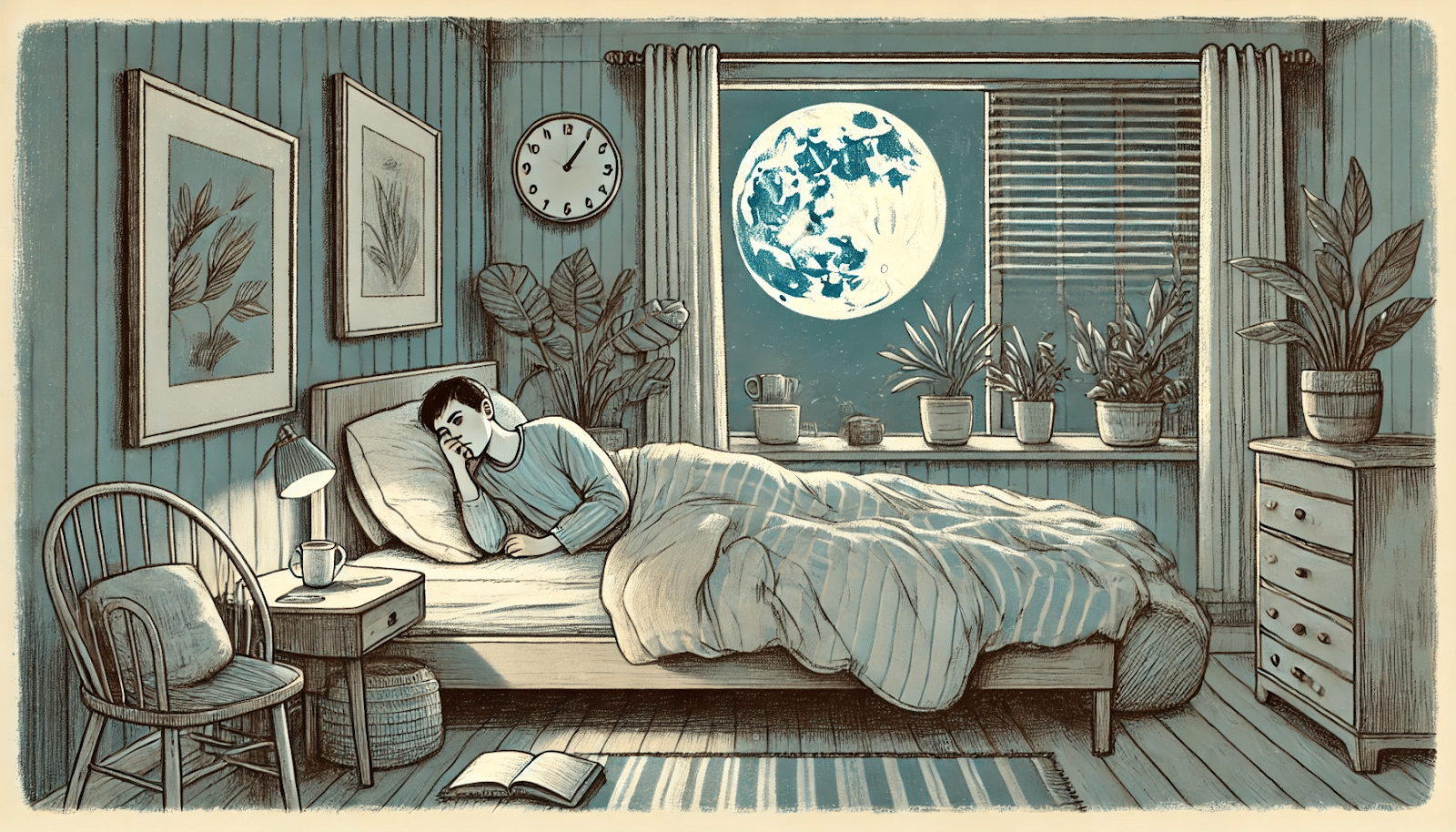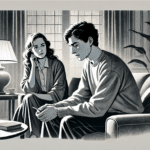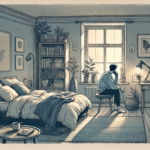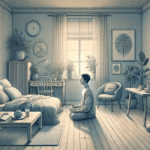Key Takeaways
- Can anxiety cause sleep loss? Yes. Physical symptoms of anxiety, like a racing heart, prevent you from falling asleep, leading to insomnia.
- Sleep deprivation can worsen anxiety symptoms, creating a negative feedback loop.
- Good sleep hygiene and anxiety management techniques like deep breathing and progressive muscle relaxation are essential to breaking this cycle.
- A Mission for Michael (AMFM) provides comprehensive and compassionate anxiety treatment plans – administered by experienced clinicians in home-like facilities across California, Virginia, and Washington.
Anxiety’s Impact on Sleep
How Anxiety Disrupts Sleep
Anxiety affects sleep by triggering the body’s stress response, which releases hormones like adrenaline and cortisol. These hormones prepare your body for a ‘fight or flight’ reaction – which makes relaxation and sleep difficult.
Your heart rate increases, muscles tense up, and your mind becomes hyper-alert – all of which are not conducive to sleep. This can lead to a pattern of insomnia, where the stress of not sleeping feeds back into your anxiety, making it even harder to rest.
| A Mission For Michael: Expert Mental Health Care Founded in 2010, A Mission For Michael (AMFM) offers specialized mental health care across Southern California, Minnesota, and Virginia. Our accredited facilities provide residential and outpatient programs, utilizing evidence-based therapies such as CBT, DBT, and EMDR. Our dedicated team of licensed professionals ensures every client receives the best care possible, supported by accreditations from The Joint Commission and the California Department of Health Care Services. We are committed to safety and personalized treatment plans. Start your recovery journey with AMFM today! |
Anxiety Symptoms and Sleep
The symptoms of anxiety can manifest in various ways that directly impact sleep. For instance, you might experience:
- Restlessness or an inability to stay still.
- Intrusive thoughts or overthinking that prevent you from relaxing.
- Nightmares or night terrors that disturb your sleep cycle.
Each of these symptoms can contribute to a poor night’s sleep, which in turn can worsen anxiety symptoms during the day.
Physical Responses to Anxiety
Beyond the mental turmoil, anxiety can cause physical reactions that make sleep difficult. A racing heart, sweaty palms, and rapid breathing are common physical responses to anxiety – and can prevent you from entering the deep, restorative stages of sleep necessary for feeling rested and refreshed.

If you’re lying in bed, trying to fall asleep, but your heart is pounding in your chest, you can’t relax. Each minute that passes feels like an hour. This is how anxiety physically manifests, preventing restful sleep.
Sleep Deprivation and Anxiety
Impact of Sleep Loss on Anxiety
When you don’t get enough sleep, your brain struggles to regulate emotions effectively. This means that everyday stressors become more challenging to manage, and anxiety levels can skyrocket and you’re more susceptible to anxiety triggers.
Lack of sleep can even worsen feelings of hopelessness or helplessness, common in anxiety disorders. This emotional toll can make daily activities feel overwhelming, further feeding into the anxiety-sleep cycle.
Cognitive Impairments
Sleep deprivation does more than just make you feel tired; it can significantly cause a decline in cognitive performance – including impairments in reaction time and sustained attention.
Emotional Health Effects
When you’re sleep-deprived, your ability to manage stress and emotions diminishes. Research published in the International Journal of Psychology found that individuals experiencing sleep deprivation show reduced positive mood.
This can lead to increased irritability, mood swings, and a reduced ability to cope with anxiety. Over time, this emotional instability can contribute to more severe mental health conditions, so it’s important to address anxiety and sleep deprivation as soon as possible.
Hormones, Anxiety & Sleep
Cortisol’s Role
Cortisol, often referred to as the “stress hormone,” is released by the adrenal glands in response to stress. While it plays an essential role in the body’s fight-or-flight response, chronic stress can lead to consistently elevated cortisol levels, disrupting sleep and increasing anxiety.
Managing stress through relaxation techniques, regular exercise, and a healthy lifestyle can help regulate cortisol levels and improve both sleep and anxiety symptoms.
Other Hormonal Imbalances
Aside from cortisol, other hormones can also play a role in anxiety and sleep issues.
For instance, thyroid hormones are crucial for regulating metabolism, and imbalances can cause symptoms such as anxiety and disrupted sleep patterns. Hyperthyroidism, characterized by an overactive thyroid, can cause insomnia and heightened anxiety.
Reproductive hormones like estrogen and progesterone can also influence anxiety and sleep, particularly in women. Fluctuations in these hormones during menstrual cycles, pregnancy, or menopause can lead to increased anxiety and sleep disturbances.
Addressing these imbalances with the help of a healthcare professional can be an important step in managing anxiety and improving sleep quality.
Breaking the Anxiety-Sleep Cycle
Sleep Hygiene Tips
Here are some actionable tips you can use to create a sleep-friendly environment and improve your sleep hygiene:
- Establish a consistent sleep schedule by going to bed and waking up at the same time every day, even on weekends.
- Aim to get about 7 to 9 hours of sleep every night.
- Create a calming bedtime routine with activities like reading or taking a warm bath to signal your body that it’s time to sleep.
- Make sure your sleep environment is comfortable, dark, and quiet. Try using blackout curtains, earplugs, or a white noise machine if necessary.
- Avoid caffeine and heavy meals close to bedtime, as they can interfere with your ability to fall asleep.
- Limit screen time in the hour leading up to bed, as the blue light emitted by devices can disrupt your natural sleep-wake cycle.
Anxiety Management Techniques
In addition to improving sleep hygiene, managing anxiety directly can have a significant impact on your sleep quality. Here are some techniques to consider:
- Practice relaxation techniques such as deep breathing, progressive muscle relaxation, or meditation to help calm your mind and body.
- Engage in regular physical activity, as exercise has been shown to reduce anxiety levels and improve sleep quality.
- Limit exposure to stressful or anxiety-inducing content, especially before bedtime, to prevent your mind from becoming overly stimulated.

Consider keeping a journal to jot down your thoughts and worries before bed, which can help clear your mind and reduce nighttime anxiety.
Get Help for Your Anxiety and Sleep at AMFM

At A Mission for Michael (AMFM), we understand how anxiety and sleep problems can create a vicious cycle that affects your overall well-being. Through our comprehensive treatment programs across California, Virginia, and Washington, we provide specialized care that addresses both your anxiety symptoms and sleep difficulties simultaneously.
Our experienced clinicians utilize evidence-based therapies like Cognitive Behavioral Therapy (CBT), combined with stress management techniques and mindfulness practices, to help you develop effective coping strategies against anxiety.
We’ll work with you to identify the root causes of your anxiety, establish healthy sleep habits, and create a personalized treatment plan that fits your needs – whether through our residential program, PHP, IOP, or outpatient services.
Don’t let anxiety continue to disrupt your sleep and quality of life. Contact us at 866-478-4383 for a free, confidential assessment and take the first step toward restful nights and peaceful days.
Frequently Asked Questions (FAQ)
Can anxiety cause insomnia?
Yes, anxiety can definitely cause insomnia. When you’re anxious, your mind races with worries and fears, which makes it difficult to relax and fall asleep. This can lead to a pattern of sleepless nights, where the stress of not sleeping feeds back into your anxiety, making it even harder to rest.
What are nighttime panic attacks?
Nighttime or nocturnal panic attacks are sudden episodes of intense fear that occur during sleep. They can wake you up with symptoms such as a racing heart, sweating, and shortness of breath. These attacks can be frightening and may contribute to ongoing sleep disturbances and anxiety.
Managing stress and practicing relaxation techniques before bed can help reduce the likelihood of experiencing nighttime panic attacks. If they persist, get professional help to address the underlying anxiety.
How does anxiety affect REM sleep?
Anxiety can disrupt the natural sleep cycle, including REM (Rapid Eye Movement) sleep, which is essential for emotional regulation and memory consolidation. When anxiety interferes with REM sleep, you may experience more vivid dreams or nightmares, leading to fragmented sleep and increased daytime anxiety.
Improving sleep hygiene and managing anxiety can help restore a healthy sleep cycle and improve the quality of REM sleep.
What is good sleep hygiene?
Good sleep hygiene means creating an environment and routine that promotes restful sleep. This includes maintaining a consistent sleep schedule, creating a calming bedtime routine, and ensuring your sleep environment is comfortable and free of distractions.
Why is AMFM the best choice for treating anxiety and sleep issues?
A Mission for Michael (AMFM) takes a comprehensive approach to treating both anxiety and sleep disorders – all thanks to our accredited facilities across three states, experienced clinicians trained by The Beck Institute, and multiple levels of care from residential to outpatient.
At AMFM, we also offer personalized treatment plans that combine evidence-based therapies, stress management techniques, and ongoing support to address both immediate symptoms and long-term recovery from anxiety.












